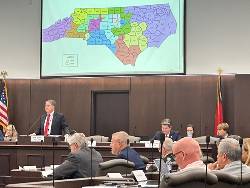President Donald Trump's call for Republicans to redraw U.S. House districts ahead of next year's election has triggered an unusual outbreak of mid-decade gerrymandering among both Republican- and Democratic-led states.
Democrats need to gain just three seats to wrest control of the House away from Republicans. And Trump hopes redistricting can help stave off historical trends, in which the president's party typically loses seats in midterm elections.
Here's what states are doing:
States that passed new US House maps
Texas — The first state to take up congressional redistricting at Trump's prodding. Republican Gov. Greg Abbott signed a new U.S. House map into law on Aug. 29 that could help Republicans win five additional seats. Republican currently hold 25 of the 38 seats. The new map faces a legal challenge.
California — The first Democratic-led state to counter Trump's redistricting push. A new U.S. House map approved Nov. 4 by voters circumvents districts adopted by an independent citizens commission after the 2020 census and replaces them with districts that could help Democrats win five additional seats. Democrats currently hold 43 of the 52 seats. The U.S. Department of Justice has joined a Republican lawsuit challenging the new districts.
Missouri — The second Republican-led state to approve new House districts sought by Trump. Republican Gov. Mike Kehoe signed a new map into law Sept. 28 that could help Republicans win an additional seat by reshaping a Democratic-held district in Kansas City. Republicans currently hold six of Missouri's eight seats. Opponents are gathering signatures for a petition that could force a statewide referendum on the map and have filed several lawsuits.
North Carolina — The third Republican-led state to approve new House districts sought by Trump. The Republican-led General Assembly gave final approval Oct. 22 to changes that could help Republicans win an additional seat by reshaping a Democratic-held district in eastern North Carolina. No gubernatorial approval is needed. Republicans currently hold 10 of the 14 seats. The revised map faces a legal challenge.
Ohio — A panel of elected officials who are primarily Republicans voted Oct. 31 to approve new U.S. House districts that could boost the GOP's chances of winning two already competitive seats. Republicans currently hold 10 of the 15 seats. Redistricting was required by the state constitution because the previous map was enacted without bipartisan support.
Utah — A judge imposed new U.S. House districts on Nov. 11 that could allow Democrats to win a seat centered in the Salt Lake County. The judge rejected a revised map that had been approved Oct. 6 by the Republican-led Legislature in response to her original ruling invalidating districts adopted after the 2020 census because lawmakers had circumvented anti-gerrymandering standards passed by voters. Republicans currently hold all four seats.
States taking steps toward congressional redistricting
Louisiana — Republican Gov. Jeff Landry in October signed legislation to delay the state’s primary elections from April 18 to May 16. The change could give lawmakers extra time to redraw U.S. House districts in case the U.S. Supreme Court overturns the state’s current congressional map. Republicans currently hold four of the six seats.
Virginia — The Democratic-led General Assembly in October endorsed a proposed a constitutional amendment allowing mid-decade redistricting in response to similar efforts elsewhere. Democrats currently hold six of the 11 U.S. House districts under a map imposed by a court in 2021 after a bipartisan commission failed to agree on a plan. The amendment needs another round of legislative approval next year to be placed on the statewide ballot.
Maryland — Democratic Maryland Gov. Wes Moore has announced a commission on congressional redistricting, even though the Democratic Senate president has said his chamber won’t move forward with redistricting because of concerns the effort to gain another Democratic seat could backfire. Democrats currently hold seven of the eight seats.
States considering mid-decade redistricting
Colorado — Democratic Attorney General Phil Weiser, a gubernatorial candidate, has expressed support for a constitutional amendment to allow mid-decade redistricting. The measure would need to go on a statewide ballot. Democrats and Republicans each currently hold four seats.
Florida — Republican state House Speaker Daniel Perez has created a special committee on congressional redistricting. Republicans currently hold 20 of the state’s 28 seats.
Illinois — U.S. House Minority Leader Hakeem Jeffries and the Democratic Congressional Campaign Committee have urged state lawmakers to redraw Illinois’ districts. Democrats currently hold 14 of the 17 seats.
Indiana — Trump and Vice President JD Vance have urged Republican lawmakers to redraw congressional districts. But lawmakers declined to convene a special session on redistricting that Republican Gov. Mike Braun had called in November. And the state Senate leader said his chamber won't meet in a December session for redistricting. Republicans currently hold seven of the nine seats.
Kansas — Republican lawmakers dropped a petition drive to call themselves into a special session on congressional redistricting in November. But they still could redraw districts during the next regular session that begins in January. Republicans currently hold three of the four seats.
New York — Democratic state lawmakers have filed a proposed constitutional amendment to allow mid-decade redistricting. The measure would need to be approved by the Legislature in two separate sessions, then placed on the statewide ballot. Democrats currently hold 19 of the 26 seats.
Nebraska — Republican Gov. Jim Pillen has expressed support for mid-decade redistricting. Republicans already hold all three House seats but could try to shore up a competitive district that includes Omaha.
...


